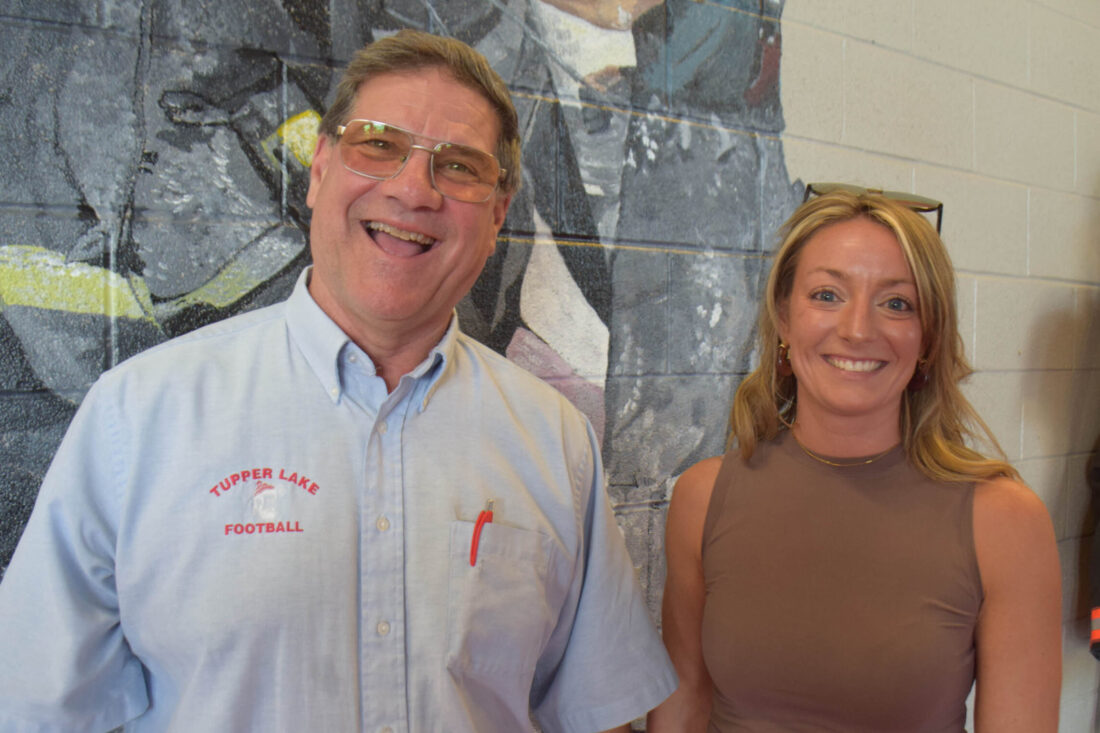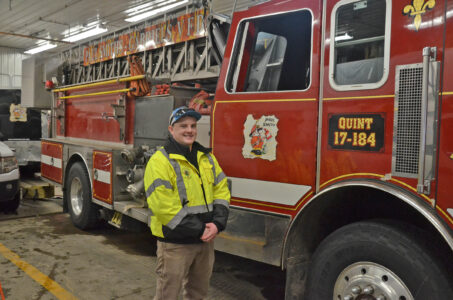Tupper heads of government outline priorities for next terms
Dattola’s focus is economic development, Fontana’s is water

Tupper Lake Town Supervisor Rickey Dattola and Village Mayor Mary Fontana are seen here in June. (Enterprise photo — Chris Gaige)
TUPPER LAKE — Town Supervisor Rickey Dattola and village Mayor Mary Fontana each won reelection on Tuesday, running unopposed for their respective positions.
While the absence of opponents created little suspense going into election night, the two heads of government here said they were grateful to voters for giving them the nod for another term in office. Each spoke with the Enterprise on election night about their priorities for the upcoming terms.
For the town supervisor, that will be a three-year term. It’s typically four years. However, a new state law shifts most local offices to even-numbered year elections, meaning that instead of being up for election again in 2029, it would be up for election in 2028. The office would then revert to a four-year term, as it would be aligned with even years. The same is true for the two town council seats elected this year, which were won by Adam Boudreau and Owen Littlefield. For more information on that election, visit tinyurl.com/3xb77275.
The village mayor position is exempt from that law, meaning the office remains its usual two-year term length and will be up for election again in 2027. The same is true for the two village trustee seats elected this year, which saw Brasen LaVassaur and David Plummer win in an uncontested race.
–
Rickey Dattola
–
Dattola was first elected supervisor in 2022, winning a special election to fill the remainder of the term that opened when former town Supervisor Clint Hollingsworth died that year after a battle with cancer. Dattola said he’s proud of the town board’s work over the past three years, and was looking forward to the next three.
“We’re going to keep working on economic development,” he said. “That’s going to be my focus, and I think it is the town board’s too. We’ve got some good, good opportunities.”
Dattola lauded the recently-completed renovations at the Tupper Lake train station, and the two activities it serves: the new Adirondack Rail Trail — which runs east to Saranac Lake and Lake Placid — and the resurrection of the Adirondack Scenic Railroad — which runs southwest to Thendara/Old Forge, Remsen and Utica.
The town is taking ownership of the train station from the state and will be in charge of operating and maintaining it. Dattola also said he was “cautiously optimistic” about an eventual reopening of the Big Tupper ski area, which was purchased at auction about a year ago by friends, business partners and Tupper Lake seasonal residents Josh Parnes and Martin Schapira.
With his first term in office under his belt, Dattola said the biggest thing he’s learned is that the wheels of government move slowly — much more so than he thought going into office, and something that’s not always apparent.
“The one thing I learned is that you’ve got to have patience, things go real slow,” he said. “When I first got in, I was like, ‘Can we do this? Can we do that? Can we do this?’ and you find out that there’s a procedure. There are ways of doing it.”
Dattola said this extends to — and is usually even more so the case — in state government. He said he understands people’s frustration about that, but noted that it’s a feature of the system, and the individuals he interacts with have been good partners in wanting progress for Tupper Lake. He said he looks forward to continuing to work with them and hopes the same is true on the other end of the line.
“If I could say one thing, I have to say this about the (state Department of Environmental Conservation), the (Adirondack) Park Agency and all the people that I deal with, that I pester all the time: they are very nice, and they do want things to move forward,” he said. “It’s just that they have a system — but I have not run into anybody who has been negative, so I hope that lasts. I hope they’re not sick of me.”
Dattola said he’s grateful for the good relationships he has with his local counterparts, and felt that the understanding and cooperation between the village and the town governments is the strongest it’s been in a long time.
“I would give Mary a tremendous amount of credit for the cooperation,” he said. “(Franklin County Legislator) Nedd Sparks is the same way. I mean, Nedd is constantly calling me, saying, ‘This is what’s going on at the county,’ so I knock on wood that the three of us get along. That’s a really good thing.”
Dattola said he’s thankful for “a great staff” in the town government and is proud of their work. He also thanked outgoing Councilman John Gillis, who lost reelection in the three-way race, for his service. Dattola said he enjoyed working with him and hoped that Gillis will stay active in his civic contributions, especially around housing with the Franklin County Land Bank.
Looking ahead, Dattola congratulated Boudreau and Littlefield on being elected to the board and looked forward to their contributions.
“I think those guys have a pretty good idea what’s going on,” he said. “They’re pretty sharp, the two of them. They’re pretty bright guys, and they ask a lot of questions. They’ve been involved in a lot of stuff, so I think they’ll get up to speed pretty quickly.”
–
Mary Fontana
–
It’s not common for a 36-year-old to have 10 years of elected office under their belt. But that’s the case for Fontana, who was first elected to the Tupper Lake Town Board in 2015, and served as the acting supervisor in the wake of Hollingsworth’s passing before being first elected village mayor in 2023.
“I’ve always been really lousy at sitting on the sidelines,” she said. “And I’m enough of a pitbull to get an idea in my head, and I just can’t let go of it. Politics really gave me an opportunity to give myself back to Tupper Lake, to root myself in this community, plant a few seeds and see where they grow.”
She said serving in local government has been one of the most rewarding, but exhausting, experiences of her life. Fontana said she was grateful and humbled that the village has faith in her to continue the job, and was looking forward to continuing her work as mayor. She said her biggest priority over the next two years, and why she wanted to run again, will be addressing the Tupper Lake water crisis.
Fontana said Tupper Lake needs help from the state. She said the village’s already-strained tax base cannot bear the costs of upgrading the water infrastructure, and that it was largely state and federal mandates that led the village to incur about $9 million in debt for drilling a set of wells that ultimately proved to be a spectacular failure in delivering clean water; instead producing iron-laden water that has ruined appliances in some parts of town, and forced residents to buy bottled water for years.
“As a resident of the state of New York, I’m pretty concerned about its priorities when it comes to infrastructure,” she said. “Tupper Lake needs to be on that list. We’ve been loud for a very long time, and I think that we’re deserving of a response.”
Fontana said it was particularly insulting to read that Gov. Kathy Hochul had sent a letter to the trustees of John Hendrickson’s estate signaling the state’s desire to purchase some 32,000 acres of land at Whitney Park. That development was first reported by James Odato, of the Adirondack Explorer.
Fontana said this wasn’t to say she was opposed to land conservation — but that it was an egregious mismatch of priorities for the state to show that it has the money to make an offer on tens of thousands of acres of land, yet won’t respond to a community’s call for help for clean, safe drinking water — a community that lies about 10 miles away from the bounds of the sought-after land.
Fontana, a Republican, said this isn’t about scoring political points — it was about crying out for a basic human right.
“That’s not a luxury, that’s a necessity,” she said. “I’m looking for a response from the state, and that can come in any fashion. I want them to acknowledge that they have encouraged us down a path that has put a burden on our residents. We can’t bathe our children in this water. We can’t drink this water.”
Whether it’s debt forgiveness or a change in eligibility guidelines for more grant opportunities, Fontana said there are numerous ways the state could use its clean water fund to help Tupper Lake out of crisis. Instead, hearing that those funds would first go to buying land to add to a forest preserve just rubs salt in the wound after years of suffering through the iron water, Fontana said.
“The fact that the state could even consider clean water, clean air funds for a purchase of vacant land 20 miles outside of Tupper Lake, but can’t find money in clean water, clean air to give our community clean drinking water … their priorities are unaligned with how the residents of this state feel,” she said. “That’s my number-one priority right now — I just need their response.”
Fontana added that her next priority, secondary to the water, is working with the town of Tupper Lake to maximize efficiency in responsibilities, getting rid of redundancy wherever it exists and ensuring that taxpayers are not overpaying for anything unnecessary.
She said serving on the town board and having a good working relationship with Dattola helps to bridge the relationship and avoid pitting the two governments at odds with each other.
“It was never a town versus village matter when we all sat together, and I think I carried that over to the village board,” she said. “It’s one community.”
She said the two governments, though, “are structured the way that they are,” and consolidating services won’t happen with the snap of a finger. Fontana said she looked forward to welcoming LaVassaur and Plummer to the village board. Her biggest piece of advice from a decade in politics was simple.
“Be honest with people,” she said. “They just want a real answer.”



